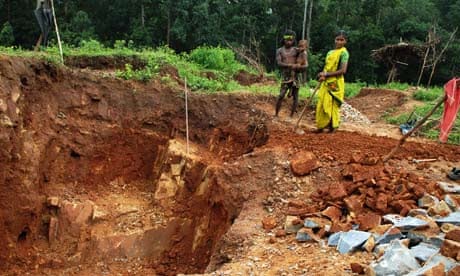The British government openly criticised mining company Vedanta Resources today over its treatment of local tribes in a sacred mountain area of India where it plans to open a bauxite mine.
In an unprecedented attack on a FTSE 100 company, the government ruled that Vedanta "did not respect the rights" of the area's indigenous people; "did not consider the impact of the construction of the mine on the [tribe's] rights"; and "failed to put in place an adequate and timely consultation mechanism". The report concluded that a change in the company's behaviour' was "essential".
Vedanta plans an open-cast mine on Niyamgiri mountain in the eastern state of Orissa. Activists believe the mine will destroy the area's ecosystem and threaten the future of the 8,000-strong Dongria Kondh tribe, who depend on the hills for their crops, water and livelihood. They hold it and the surrounding forest as the sacred home of their god Niyam Raja.
The damning verdict came after a nine- month investigation into a complaint submitted by charity Survival International against Vedanta's plans. The complaint was dealt with by a governmental agency charged with promoting guidelines on ethical corporate behaviour for multinational companies adopted by the Organisation for Economic Co-operation and Development (OECD).
Despite repeated British government requests, Vedanta "failed to provide any evidence during the examination". This is the only time a company has refused to participate in an OECD investigation.
Survival's director Stephen Corry said: "We're very pleased that the UK government has finally taken a stand on this – it's already one of the most notorious mining projects in the world. Vedanta failed even to inform the Dongria Kondh that it plans to turn their sacred mountain into a vast open-pit mine, yet the tribe has the right under international law to give – or withhold – their consent. This is, after all, something which will have a dramatic, terrible impact on their lives."
Human rights campaigner Bianca Jagger, who joined protests against Vedanta in London in the summer, said: "It is my hope that the report will convince the Indian government to consider the impact this project will have on the Kondh people, the region, and the environment.
She added that she hoped the report would put more pressure on the Church of England to give up its stake in Vedanta, a highly successful company that has risen to the FTSE 100 index of leading shares on the back of the global commodity boom.
A spokesman for the Church of England's Ethical Investment Advisory Group, which advises the church on where it should be investing, said: "We will continue to engage with Vedanta on the development of its environmental and social policies and its corporate governance.
"We are encouraging Vedanta to engage constructively with their key stakeholders, including their critics, and also encouraging ActionAid and Survival International to keep us informed of their perception of the impact on the community and environment so that we can engage most effectively with the company."
MP Diane Abbott said: "I am very pleased with the government's response to the complaint made against Vedanta. Many multinational companies still like to believe they can plough on with destructive projects with no fear of retribution. This is proof that they cannot. However the fight must continue to push Vedanta into actually implementing the government's recommendations. And given their track record so far, including not even submitting evidence during the complaint against them, this may be tough."
The ruling is the third major embarrassment in five months for Anil Agarwal, Vedanta's founder and executive chairman. In June an environmental award was withheld at the last minute when details of the Orissa mine were brought to the jury's attention and in August India's environment minister admitted that the project should never have been approved.
A Vedanta spokesperson said: "Vedanta refutes the conclusions [of the report] and has complied in all respects with Indian regulations including consultations with the local community.
"The company considers the criticisms to be both inaccurate and inappropriate given that the Indian authorities have jurisdiction on this matter and have reached their own conclusions through the proper legal process. Vedanta is committed to conducting its activities according to internationally accepted sustainable development principles, and to conducting this project sensitively in conjunction with our joint venture partner."


Comments (…)
Sign in or create your Guardian account to join the discussion